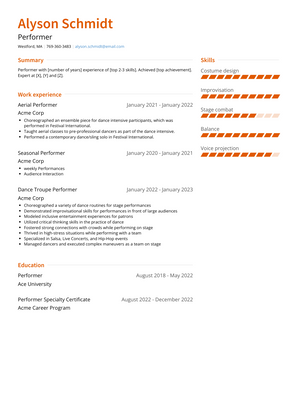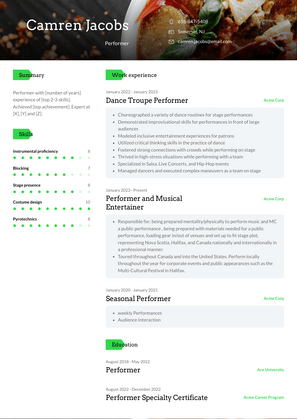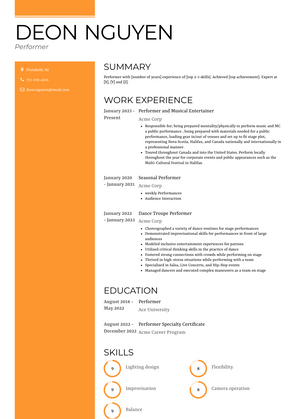3+ Performer Resume Examples and Templates
This page provides you with Performer resume samples to use to create your own resume with our easy-to-use resume builder. Below you'll find our how-to section that will guide you through each section of a Performer resume.



How to Write a Performer Resume?
To write a professional Performer resume, follow these steps:
- Select the right Performer resume template.
- Write a professional summary at the top explaining your Performer’s experience and achievements.
- Follow the STAR method while writing your Performer resume’s work experience. Show what you were responsible for and what you achieved as a Performer.
- List your top Performer skills in a separate skills section.
How to Write Your Performer Resume Header?
Write the perfect Performer resume header by:
- Adding your full name at the top of the header.
- Add a photo to your resume if you are applying for jobs outside of the US. For applying to jobs within the US, avoid adding photo to your resume header.
- Add your current Performer to the header to show relevance.
- Add your current city, your phone number and a professional email address.
- Finally, add a link to your portfolio to the Performer resume header. If there’s no portfolio link to add, consider adding a link to your LinkedIn profile instead.
Bad Performer Resume Example - Header Section
Valentin 167 Hamilton Drive Phillipsburg, NJ 08865 Marital Status: Married, email: cooldude2022@gmail.com
Good Performer Resume Example - Header Section
Valentin Ross, Phillipsburg, NJ, Phone number: +1-555-555-5555, Link: linkedin/in/johndoe
Make sure to add a professional looking email address while writing your resume header. Let’s assume your name is John Doe - here is a formula you can use to create email addresses:
- firstnamelastname@email.com - johndoe@email.com
- firstname.lastname@email.com - john.doe@email.com
- lastname.firstname@email.com - doe.john@email.com
- f.lastname@email.com - j.doe@email.com
- l.firstname@email.com - d.john@email.com
- firstnamelastname12@email.com - johndoe12@email.com
For a Performer email, we recommend you either go with a custom domain name (john@johndoe.com) or select a very reputed email provider (Gmail or Outlook).
How to Write a Professional Performer Resume Summary?
Use this template to write the best Performer resume summary: Performer with [number of years] experience of [top 2-3 skills]. Achieved [top achievement]. Expert at [X], [Y] and [Z].
How to Write a Performer Resume Experience Section?
Here’s how you can write a job winning Performer resume experience section:
- Write your Performer work experience in a reverse chronological order.
- Use bullets instead of paragraphs to explain your Performer work experience.
- While describing your work experience focus on highlighting what you did and the impact you made (you can use numbers to describe your success as a Performer).
- Use action verbs in your bullet points.
Performer and Musical Entertainer Resume Example
Performer and Musical Entertainer
- Responsible for; being prepared mentality/physically to perform music and MC a public performance , being prepared with materials needed for a public performance, loading gear in/out of venues and set up to fit stage plot, representing Nova Scotia, Halifax, and Canada nationally and internationally in a professional manner.
- Toured throughout Canada and into the United States. Perform locally throughout the year for corporate events and public appearances such as the Multi-Cultural Festival in Halifax.
Dance Troupe Performer Resume Example
Dance Troupe Performer
- Choreographed a variety of dance routines for stage performances
- Demonstrated improvisational skills for performances in front of large audiences
- Modeled inclusive entertainment experiences for patrons
- Utilized critical thinking skills in the practice of dance
- Fostered strong connections with crowds while performing on stage
- Thrived in high-stress situations while performing with a team
- Specialized in Salsa, Live Concerts, and Hip-Hop events
- Managed dancers and executed complex maneuvers as a team on stage
Aerial Performer Resume Example
Aerial Performer
- Choreographed an ensemble piece for dance intensive participants, which was performed in Festival International.
- Taught aerial classes to pre-professional dancers as part of the dance intensive.
- Performed a contemporary dance/sling solo in Festival International.
Seasonal Performer Resume Example
Seasonal Performer
- weekly Performances
- Audience Interaction
Top Performer Resume Skills for 2023
- Stage presence
- Breath control
- Voice projection
- Vocal range
- Instrumental proficiency
- Timing
- Rhythm
- Dance technique
- Flexibility
- Balance
- Acrobatics
- Physical strength
- Acting technique
- Characterization
- Improvisation
- Script analysis
- Blocking
- Stage combat
- Makeup application
- Costume design
- Set design
- Lighting design
- Sound design
- Audio editing
- Video editing
- Camera operation
- Projection mapping
- Rigging
- Pyrotechnics
- Special effects
How Long Should my Performer Resume be?
Your Performer resume length should be less than one or two pages maximum. Unless you have more than 25 years of experience, any resume that’s more than two pages would appear to be too long and risk getting rejected.
On an average, for Performer, we see most resumes have a length of 2. And, that’s why we advise you to keep the resume length appropriate to not get rejected.
Frequently Asked Questions (FAQs) for Performer Resume
-
What does a Performer do?
- A Performer is an entertainer who showcases their talents in various artistic forms, such as acting, singing, dancing, music, comedy, or other forms of live entertainment. Performers may work in theater, film, television, music concerts, cruise ships, theme parks, or other venues.
-
What qualifications are important for a Performer position?
- Qualifications may vary depending on the specific field of performance, but generally, performers benefit from training and experience in their chosen art form. This may include formal education from performing arts schools, conservatories, or specialized training programs, as well as practical experience gained through performances, auditions, and workshops.
-
What kind of experience should a Performer highlight on their resume?
- Performers should highlight relevant experience such as roles played in theater productions, performances in music concerts or bands, appearances in films or television shows, or any other significant performances they have participated in. They can also include experience with specific skills such as singing, dancing, acting, or playing musical instruments.
-
How important is it for a Performer to demonstrate versatility on their resume?
- Versatility is often highly valued in the performing arts industry as it allows performers to take on a variety of roles and adapt to different styles and genres. Highlighting experience in multiple areas of performance or showcasing proficiency in various skills can demonstrate versatility and expand opportunities for employment.
-
Should a Performer include their training and education on their resume?
- Yes, including training and education relevant to the performing arts field can demonstrate the performer's commitment to their craft and their level of expertise. This may include degrees, diplomas, certifications, or completed courses from reputable institutions or programs.
-
What soft skills are important for a Performer to highlight on their resume?
- Soft skills such as creativity, adaptability, collaboration, communication, and stage presence are crucial for performers. These skills contribute to delivering compelling performances, working effectively with directors, fellow cast members, and crew, and engaging with audiences.
-
Is it necessary for a Performer to mention their performance credits on their resume?
- Yes, mentioning performance credits, including roles played, productions participated in, and venues performed at, can provide valuable context for the performer's experience and showcase their professional accomplishments.
-
How should a Performer tailor their resume for different types of performance opportunities?
- A performer should customize their resume to highlight experience and skills relevant to the specific types of performance opportunities they are pursuing. For example, if seeking roles in musical theater, they may emphasize singing and dancing abilities, whereas for film auditions, they may focus on acting experience and on-screen credits.
-
Should a Performer include headshots or portfolio samples with their resume?
- In some cases, performers may choose to include headshots, demo reels, or portfolio samples along with their resume, especially when submitting applications for acting roles, modeling gigs, or similar opportunities. However, it's essential to ensure that any additional materials are professional and relevant to the application.
-
How can a Performer make their resume visually appealing and easy to read?
- Utilizing a clean and professional layout, clear headings, and bullet points to organize information can enhance the readability of the resume. Additionally, including specific details about notable performances, skills, and achievements can make the resume more engaging and memorable.
Copyright ©2025 Workstory Inc.
